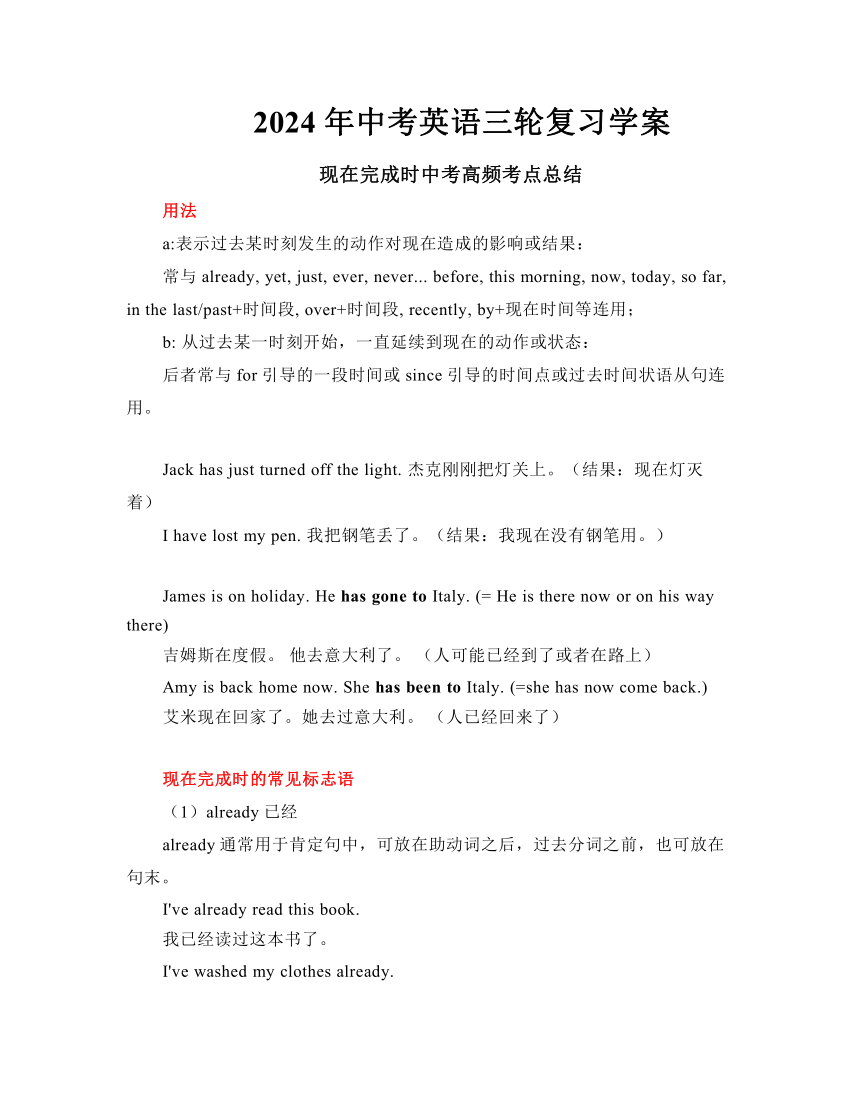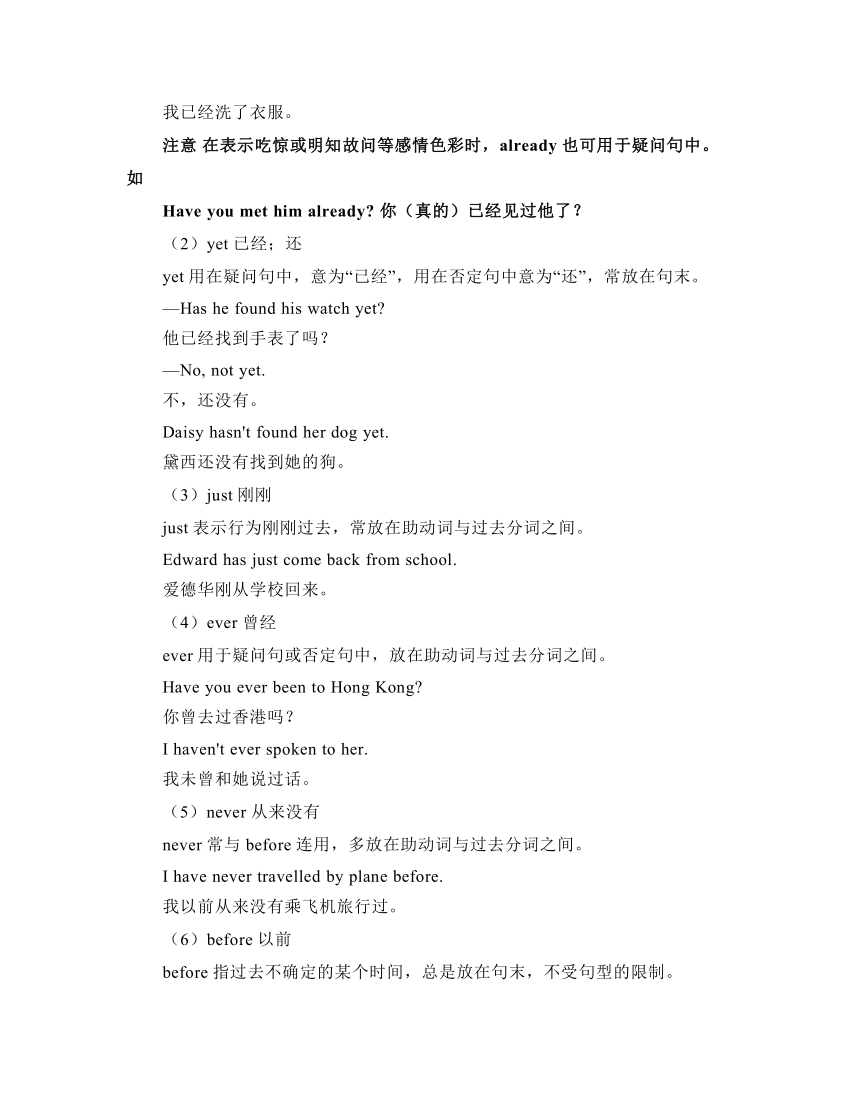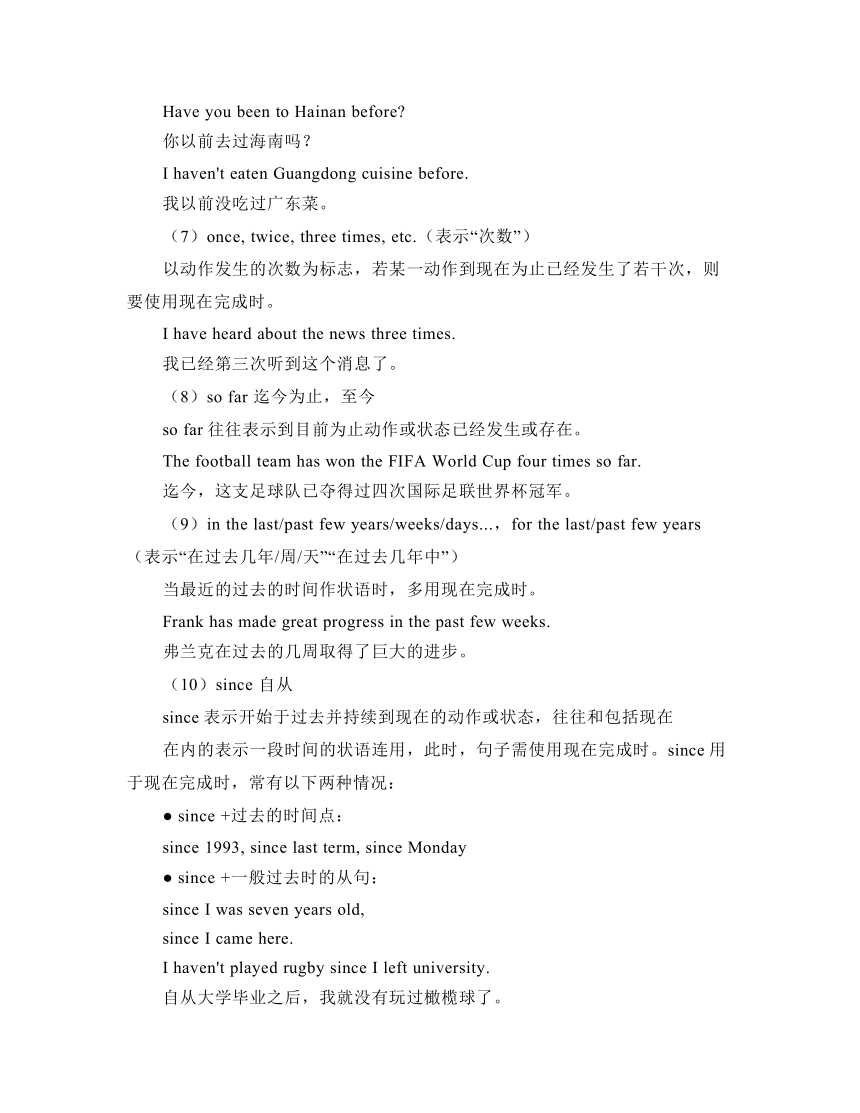2024年中考英语三轮复习学案现在完成时中考高频考点总结
文档属性
| 名称 | 2024年中考英语三轮复习学案现在完成时中考高频考点总结 |

|
|
| 格式 | docx | ||
| 文件大小 | 19.1KB | ||
| 资源类型 | 教案 | ||
| 版本资源 | 通用版 | ||
| 科目 | 英语 | ||
| 更新时间 | 2024-03-31 22:43:51 | ||
图片预览



文档简介
2024年中考英语三轮复习学案
现在完成时中考高频考点总结
用法
a:表示过去某时刻发生的动作对现在造成的影响或结果:
常与already, yet, just, ever, never... before, this morning, now, today, so far, in the last/past+时间段, over+时间段, recently, by+现在时间等连用;
b: 从过去某一时刻开始,一直延续到现在的动作或状态:
后者常与for引导的一段时间或since引导的时间点或过去时间状语从句连用。
Jack has just turned off the light. 杰克刚刚把灯关上。(结果:现在灯灭着)
I have lost my pen. 我把钢笔丢了。(结果:我现在没有钢笔用。)
James is on holiday. He has gone to Italy. (= He is there now or on his way there)
吉姆斯在度假。 他去意大利了。 (人可能已经到了或者在路上)
Amy is back home now. She has been to Italy. (=she has now come back.)
艾米现在回家了。她去过意大利。 (人已经回来了)
现在完成时的常见标志语
(1)already已经
already通常用于肯定句中,可放在助动词之后,过去分词之前,也可放在句末。
I've already read this book.
我已经读过这本书了。
I've washed my clothes already.
我已经洗了衣服。
注意 在表示吃惊或明知故问等感彩时,already也可用于疑问句中。如
Have you met him already 你(真的)已经见过他了?
(2)yet已经;还
yet用在疑问句中,意为“已经”,用在否定句中意为“还”,常放在句末。
—Has he found his watch yet
他已经找到手表了吗?
—No, not yet.
不,还没有。
Daisy hasn't found her dog yet.
黛西还没有找到她的狗。
(3)just刚刚
just表示行为刚刚过去,常放在助动词与过去分词之间。
Edward has just come back from school.
爱德华刚从学校回来。
(4)ever曾经
ever用于疑问句或否定句中,放在助动词与过去分词之间。
Have you ever been to Hong Kong
你曾去过香港吗?
I haven't ever spoken to her.
我未曾和她说过话。
(5)never从来没有
never常与before连用,多放在助动词与过去分词之间。
I have never travelled by plane before.
我以前从来没有乘飞机旅行过。
(6)before以前
before指过去不确定的某个时间,总是放在句末,不受句型的限制。
Have you been to Hainan before
你以前去过海南吗?
I haven't eaten Guangdong cuisine before.
我以前没吃过广东菜。
(7)once, twice, three times, etc.(表示“次数”)
以动作发生的次数为标志,若某一动作到现在为止已经发生了若干次,则要使用现在完成时。
I have heard about the news three times.
我已经第三次听到这个消息了。
(8)so far 迄今为止,至今
so far往往表示到目前为止动作或状态已经发生或存在。
The football team has won the FIFA World Cup four times so far.
迄今,这支足球队已夺得过四次国际足联世界杯冠军。
(9)in the last/past few years/weeks/days...,for the last/past few years(表示“在过去几年/周/天”“在过去几年中”)
当最近的过去的时间作状语时,多用现在完成时。
Frank has made great progress in the past few weeks.
弗兰克在过去的几周取得了巨大的进步。
(10)since 自从
since表示开始于过去并持续到现在的动作或状态,往往和包括现在
在内的表示一段时间的状语连用,此时,句子需使用现在完成时。since用于现在完成时,常有以下两种情况:
● since +过去的时间点:
since 1993, since last term, since Monday
● since +一般过去时的从句:
since I was seven years old,
since I came here.
I haven't played rugby since I left university.
自从大学毕业之后,我就没有玩过橄榄球了。
(11)for后接一段时间,表示“持续多久”,如for ten years, for a while, for two days等。
The old woman has been away from her hometown for 40 years.
这位老妇人已经离开家乡40年了。
(12)lately, recently近来,最近
Lately, I've had trouble sleeping.
最近我老是失眠。
Mr.Brown has recently been promoted to Assistant Manager.
布朗先生最近被提升为副经理了。
应注意现在完成时与一般过去时的区别:
a:
现在完成时强调过去的事情对现在的影响;
一般过去时常与具体的时间状语连用,表示过去某时发生的动作或单纯叙述过去的事情,强调动作。试比较:
I have seen this film.
这部电影我看过了。(强调对现在的影响,电影的内容已经知道了)
I saw this film yesterday.
我昨天看了这部电影。(强调看的动作发生过了)
b:
现在完成时表示新事情或最近发生的事情
"Maria has had a baby! It's a boy." ‘That's great news.’
玛利亚最近刚生了孩子,是个男孩。 那是好消息。
一般过去时表示非最近发生的事情,相对比较久远
Who invented paper
比较:
Somebody has invented a new type of washing machine.
Who invented telephone (not had invented)
Jack lives in Beijing. He has lived there for seven years.
杰克住在北京。他已经在哪儿住了七年。(他现在仍旧住在北京)
Jack lived in Beijing for ten years. Now he lives in Shanghai.
杰克曾在北京住了十年。 如今他住在上海。 (他现在不住在北京,住在上海)
特殊用法
① 用于现在完成时的句型:
A. It is the first/second time... that... 结构中的从句部分,用现在完成时。
It is the first time that I have visited the city.
这是我第一次参观这座城市。
B. This is the... that... 结构,that从句要用现在完成时。
This is the first time that I’ve heard him sing.
这是我第一次听他唱歌。
② 非延续性动词表示行为的结果,不能与表示时间段的状语连用。
即非延续性动词在现在完成时的肯定句中不能和for, since引导的时间状语连用,也不能用在how long引导的特殊疑问句中。
在以when提问的特殊疑问中不能用现在完成时。
另外,ago不能用于现在完成时的句子中,因为它表示从现在算起的以前某个时间,属于表示具体过去时间的状语。可以用before来表示“以前”这一含义。
注意
非延续性动词的否定形式可以与表示延续时间的状语连用。
即动作不发生的状态是可以持续的。
(错)I have seen him for a month.
(对)I haven’t seen him for almost a month. 我几乎有一个月没有见到他了。
③ 大部分非延续性动词可以根据实际情况改为相应的延续性动词
来表达相同或相近的意思,举例如下:
buy→have
begin/start→be on
put on→wear
borrow/lend→keep
leave→be away(from)
die→be dead
get to know→know
come→be/live/stay
join→be in/be a member of
finish→be over
get up/wake up→be up
catch a cold→have a cold
go to school→be at school
get/ receive(接收)→have
hear from→have a letter from
go/come/arrive /get(到达)/reach→be(in/at)
get/fall asleep/go to sleep→ sleep, be asleep
现在完成时中考高频考点总结
用法
a:表示过去某时刻发生的动作对现在造成的影响或结果:
常与already, yet, just, ever, never... before, this morning, now, today, so far, in the last/past+时间段, over+时间段, recently, by+现在时间等连用;
b: 从过去某一时刻开始,一直延续到现在的动作或状态:
后者常与for引导的一段时间或since引导的时间点或过去时间状语从句连用。
Jack has just turned off the light. 杰克刚刚把灯关上。(结果:现在灯灭着)
I have lost my pen. 我把钢笔丢了。(结果:我现在没有钢笔用。)
James is on holiday. He has gone to Italy. (= He is there now or on his way there)
吉姆斯在度假。 他去意大利了。 (人可能已经到了或者在路上)
Amy is back home now. She has been to Italy. (=she has now come back.)
艾米现在回家了。她去过意大利。 (人已经回来了)
现在完成时的常见标志语
(1)already已经
already通常用于肯定句中,可放在助动词之后,过去分词之前,也可放在句末。
I've already read this book.
我已经读过这本书了。
I've washed my clothes already.
我已经洗了衣服。
注意 在表示吃惊或明知故问等感彩时,already也可用于疑问句中。如
Have you met him already 你(真的)已经见过他了?
(2)yet已经;还
yet用在疑问句中,意为“已经”,用在否定句中意为“还”,常放在句末。
—Has he found his watch yet
他已经找到手表了吗?
—No, not yet.
不,还没有。
Daisy hasn't found her dog yet.
黛西还没有找到她的狗。
(3)just刚刚
just表示行为刚刚过去,常放在助动词与过去分词之间。
Edward has just come back from school.
爱德华刚从学校回来。
(4)ever曾经
ever用于疑问句或否定句中,放在助动词与过去分词之间。
Have you ever been to Hong Kong
你曾去过香港吗?
I haven't ever spoken to her.
我未曾和她说过话。
(5)never从来没有
never常与before连用,多放在助动词与过去分词之间。
I have never travelled by plane before.
我以前从来没有乘飞机旅行过。
(6)before以前
before指过去不确定的某个时间,总是放在句末,不受句型的限制。
Have you been to Hainan before
你以前去过海南吗?
I haven't eaten Guangdong cuisine before.
我以前没吃过广东菜。
(7)once, twice, three times, etc.(表示“次数”)
以动作发生的次数为标志,若某一动作到现在为止已经发生了若干次,则要使用现在完成时。
I have heard about the news three times.
我已经第三次听到这个消息了。
(8)so far 迄今为止,至今
so far往往表示到目前为止动作或状态已经发生或存在。
The football team has won the FIFA World Cup four times so far.
迄今,这支足球队已夺得过四次国际足联世界杯冠军。
(9)in the last/past few years/weeks/days...,for the last/past few years(表示“在过去几年/周/天”“在过去几年中”)
当最近的过去的时间作状语时,多用现在完成时。
Frank has made great progress in the past few weeks.
弗兰克在过去的几周取得了巨大的进步。
(10)since 自从
since表示开始于过去并持续到现在的动作或状态,往往和包括现在
在内的表示一段时间的状语连用,此时,句子需使用现在完成时。since用于现在完成时,常有以下两种情况:
● since +过去的时间点:
since 1993, since last term, since Monday
● since +一般过去时的从句:
since I was seven years old,
since I came here.
I haven't played rugby since I left university.
自从大学毕业之后,我就没有玩过橄榄球了。
(11)for后接一段时间,表示“持续多久”,如for ten years, for a while, for two days等。
The old woman has been away from her hometown for 40 years.
这位老妇人已经离开家乡40年了。
(12)lately, recently近来,最近
Lately, I've had trouble sleeping.
最近我老是失眠。
Mr.Brown has recently been promoted to Assistant Manager.
布朗先生最近被提升为副经理了。
应注意现在完成时与一般过去时的区别:
a:
现在完成时强调过去的事情对现在的影响;
一般过去时常与具体的时间状语连用,表示过去某时发生的动作或单纯叙述过去的事情,强调动作。试比较:
I have seen this film.
这部电影我看过了。(强调对现在的影响,电影的内容已经知道了)
I saw this film yesterday.
我昨天看了这部电影。(强调看的动作发生过了)
b:
现在完成时表示新事情或最近发生的事情
"Maria has had a baby! It's a boy." ‘That's great news.’
玛利亚最近刚生了孩子,是个男孩。 那是好消息。
一般过去时表示非最近发生的事情,相对比较久远
Who invented paper
比较:
Somebody has invented a new type of washing machine.
Who invented telephone (not had invented)
Jack lives in Beijing. He has lived there for seven years.
杰克住在北京。他已经在哪儿住了七年。(他现在仍旧住在北京)
Jack lived in Beijing for ten years. Now he lives in Shanghai.
杰克曾在北京住了十年。 如今他住在上海。 (他现在不住在北京,住在上海)
特殊用法
① 用于现在完成时的句型:
A. It is the first/second time... that... 结构中的从句部分,用现在完成时。
It is the first time that I have visited the city.
这是我第一次参观这座城市。
B. This is the... that... 结构,that从句要用现在完成时。
This is the first time that I’ve heard him sing.
这是我第一次听他唱歌。
② 非延续性动词表示行为的结果,不能与表示时间段的状语连用。
即非延续性动词在现在完成时的肯定句中不能和for, since引导的时间状语连用,也不能用在how long引导的特殊疑问句中。
在以when提问的特殊疑问中不能用现在完成时。
另外,ago不能用于现在完成时的句子中,因为它表示从现在算起的以前某个时间,属于表示具体过去时间的状语。可以用before来表示“以前”这一含义。
注意
非延续性动词的否定形式可以与表示延续时间的状语连用。
即动作不发生的状态是可以持续的。
(错)I have seen him for a month.
(对)I haven’t seen him for almost a month. 我几乎有一个月没有见到他了。
③ 大部分非延续性动词可以根据实际情况改为相应的延续性动词
来表达相同或相近的意思,举例如下:
buy→have
begin/start→be on
put on→wear
borrow/lend→keep
leave→be away(from)
die→be dead
get to know→know
come→be/live/stay
join→be in/be a member of
finish→be over
get up/wake up→be up
catch a cold→have a cold
go to school→be at school
get/ receive(接收)→have
hear from→have a letter from
go/come/arrive /get(到达)/reach→be(in/at)
get/fall asleep/go to sleep→ sleep, be asleep
同课章节目录
